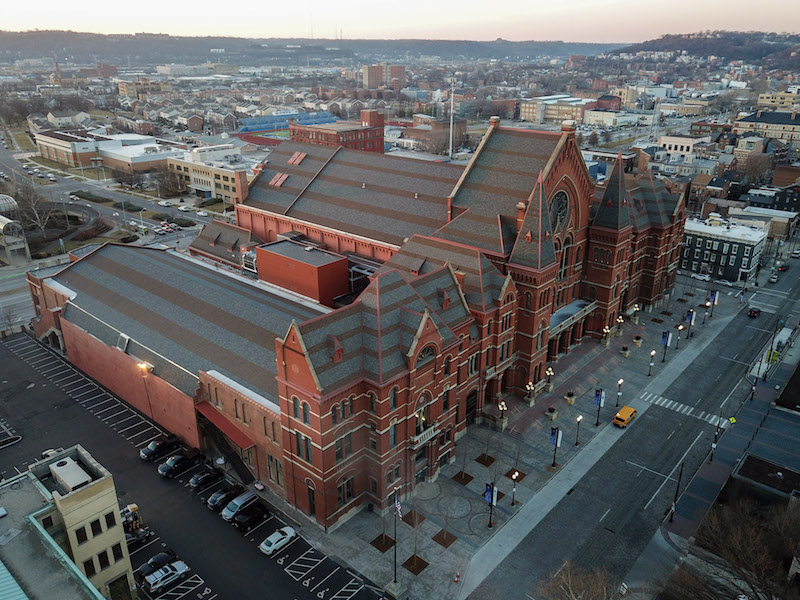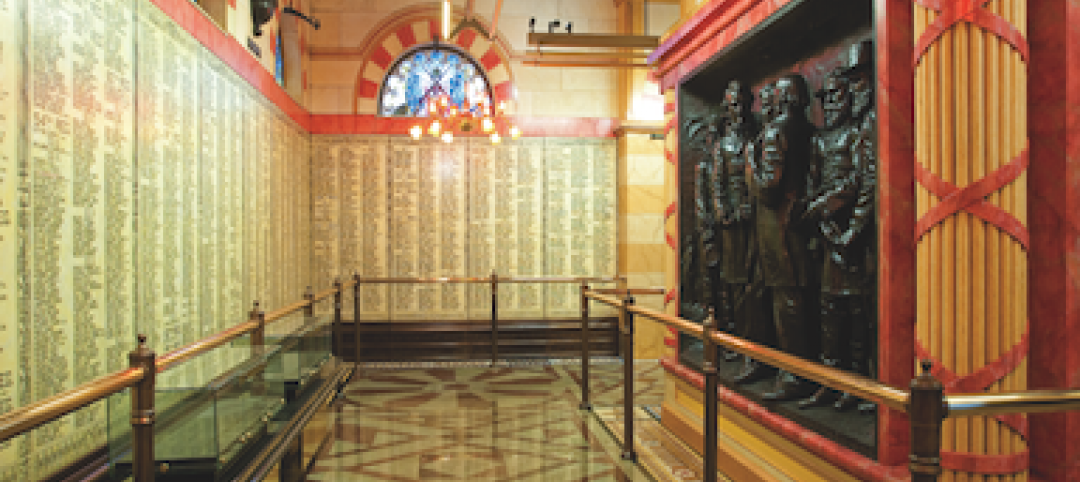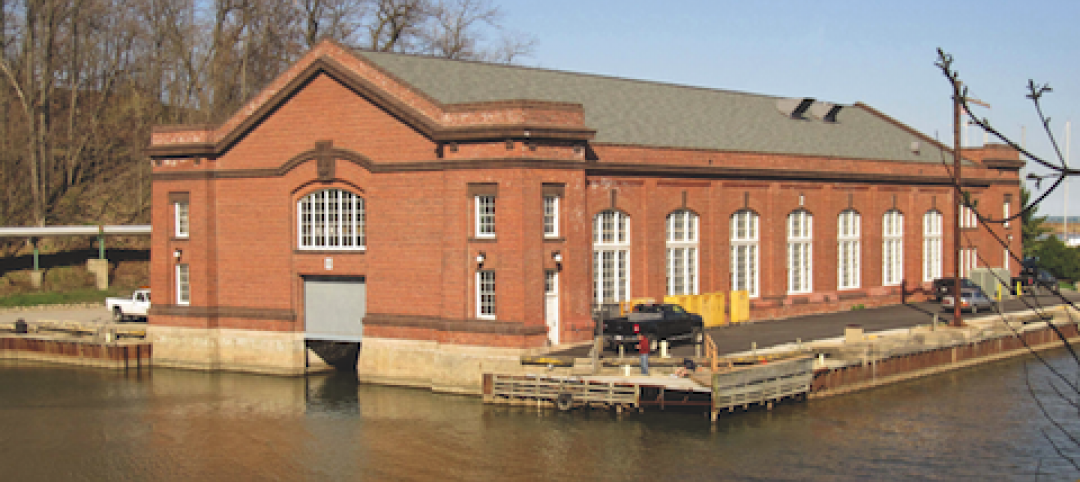A Cincinnati landmark with a rich and unique history recently received a total facelift, restoring the facility to the grandeur it displayed when it opened 140 years ago.
Workers tackled a 16-month, $143-million project at Cincinnati Music Hall, and finished the project last October. Music Hall, which is the home of the Cincinnati Symphony Orchestra and several other cultural organizations, reduced seating capacity at Springer Auditorium from 3,417 to 2,263-2,2524, depending on the configuration. The project included updates to the roof, exterior, Edyth B. Lindner Grand Foyer, Corbett Tower, Library and Ballroom. In all, the project added 31,549 square feet in the same footprint.
“We’ve been in business since 1880 and take pride in our work on many of the iconic buildings in Cincinnati,’’ said Andrew Imbus, Project Manager at Imbus Roofing of Wilder, Kentucky. “This is a project that we are going to be proud of for a very long time.”
Music Hall, which was recognized in January 1975 as a National Historic Landmark by the U.S. Department of the Interior, also serves as the home of the Cincinnati Opera, Cincinnati Pops Orchestra and May Festival Chorus.
One of the most challenging assignments in the major remodeling effort was the roof. Imbus and his team had installed the previous roof in 1988. “It was worn, but still water tight,’’ Imbus said. “Some shingles were starting to blow off.”
 The project included seven BILCO double-leaf hatch smoke hatches that will exhaust smoke and hot gases in the event of a fire to aid emergency evacuation and to protect the building contents.
The project included seven BILCO double-leaf hatch smoke hatches that will exhaust smoke and hot gases in the event of a fire to aid emergency evacuation and to protect the building contents.
Imbus’ first charge was to find replacement shingles that mirrored those of the past roof to preserve the historical appearance of the building. The roof also required new double leaf smoke hatches, manufactured by The BILCO Company of New Haven, Connecticut. Imbus’ team installed seven DSH Automatic Smoke Vents. The vents, which measure 66 inches by 144 inches, are among the largest smoke hatches on the commercial market.
The smoke vents include a Thermolatch® II positive release mechanism that ensures reliable vent operation when a fire occurs. The vents automatically release upon the melting of a UL-listed 165F fusible link, and a curb-mounted fusible link allows the latch to be easily re-set from the roof level. The vents are fully insulated and gasketed for weather tightness.
The vents are hard-wired to the fire suppression system and open electronically if the sprinkler system activates. Corken Steel, the local distributor of the smoke vents, and BILCO rep Joe DeFrain of Welling, Inc., worked with Imbus in procuring the roof hatches. The vents were installed above the main hall, Springer Auditorium, and are designed to open in an emergency to allow smoke and hot gases to escape. This allows better visibility and breathing conditions for audience members and performers to evacuate safely and aid firefighters in their containment efforts.
Perhaps the centerpiece to the improvements occurred at Springer Auditorium, where accessibility and sightlines were improved. The seats increased in width size and the distance between rows also increased. In addition, the renovations made the building compliant with the Americans with Disabilities Act, with increased wheelchair accessible seating in prime locations, and easier movement between floors.
“This was an important project for Cincinnati,’’ said Joe DeFrain, a BILCO representative with Welling, Inc. “It’s part of a revitalization of the entire community. Everyone in Cincinnati knows the Music Hall. We’re a third generation, family-owned company from Cincinnati, and we’re proud to have been a part of it.”
Related Stories
| Nov 9, 2010
U.S. Army steps up requirements for greening building
Cool roofs, solar water heating, and advanced metering are among energy-efficiency elements that will have to be used in new permanent Army buildings in the U.S. and abroad starting in FY 2013. Designs for new construction and major renovations will incorporate sustainable design and development principles contained in ASHRAE 189.1.
| Nov 3, 2010
Sailing center sets course for energy efficiency, sustainability
The Milwaukee (Wis.) Community Sailing Center’s new facility on Lake Michigan counts a geothermal heating and cooling system among its sustainable features. The facility was designed for the nonprofit instructional sailing organization with energy efficiency and low operating costs in mind.
| Nov 2, 2010
A Look Back at the Navy’s First LEED Gold
Building Design+Construction takes a retrospective tour of a pace-setting LEED project.
| Nov 2, 2010
Wind Power, Windy City-style
Building-integrated wind turbines lend a futuristic look to a parking structure in Chicago’s trendy River North neighborhood. Only time will tell how much power the wind devices will generate.
| Oct 13, 2010
Biloxi’s convention center bigger, better after Katrina
The Mississippi Coast Coliseum and Convention Center in Biloxi is once again open for business following a renovation and expansion necessitated by Hurricane Katrina.
| Oct 13, 2010
Residences bring students, faculty together in the Middle East
A new residence complex is in design for United Arab Emirates University in Al Ain, UAE, near Abu Dhabi. Plans for the 120-acre mixed-use development include 710 clustered townhomes and apartments for students and faculty and common areas for community activities.
| Oct 12, 2010
Cuyahoga County Soldiers’ and Sailors’ Monument, Cleveland, Ohio
27th Annual Reconstruction Awards—Gold Award. The Cuyahoga County Soldiers’ and Sailors’ Monument was dedicated on the Fourth of July, 1894, to honor the memory of the more than 9,000 Cuyahoga County veterans of the Civil War.
| Oct 12, 2010
Building 13 Naval Station, Great Lakes, Ill.
27th Annual Reconstruction Awards—Gold Award. Designed by Chicago architect Jarvis Hunt and constructed in 1903, Building 13 is one of 39 structures within the Great Lakes Historic District at Naval Station Great Lakes, Ill.
| Sep 13, 2010
World's busiest land port also to be its greenest
A larger, more efficient, and supergreen border crossing facility is planned for the San Ysidro (Calif.) Port of Entry to better handle the more than 100,000 people who cross the U.S.-Mexico border there each day.
| Sep 13, 2010
Triple-LEED for Engineering Firm's HQ
With more than 250 LEED projects in the works, Enermodal Engineering is Canada's most prolific green building consulting firm. In 2007, with the firm outgrowing its home office in Kitchener, Ont., the decision was made go all out with a new green building. The goal: triple Platinum for New Construction, Commercial Interiors, and Existing Buildings: O&M.
















